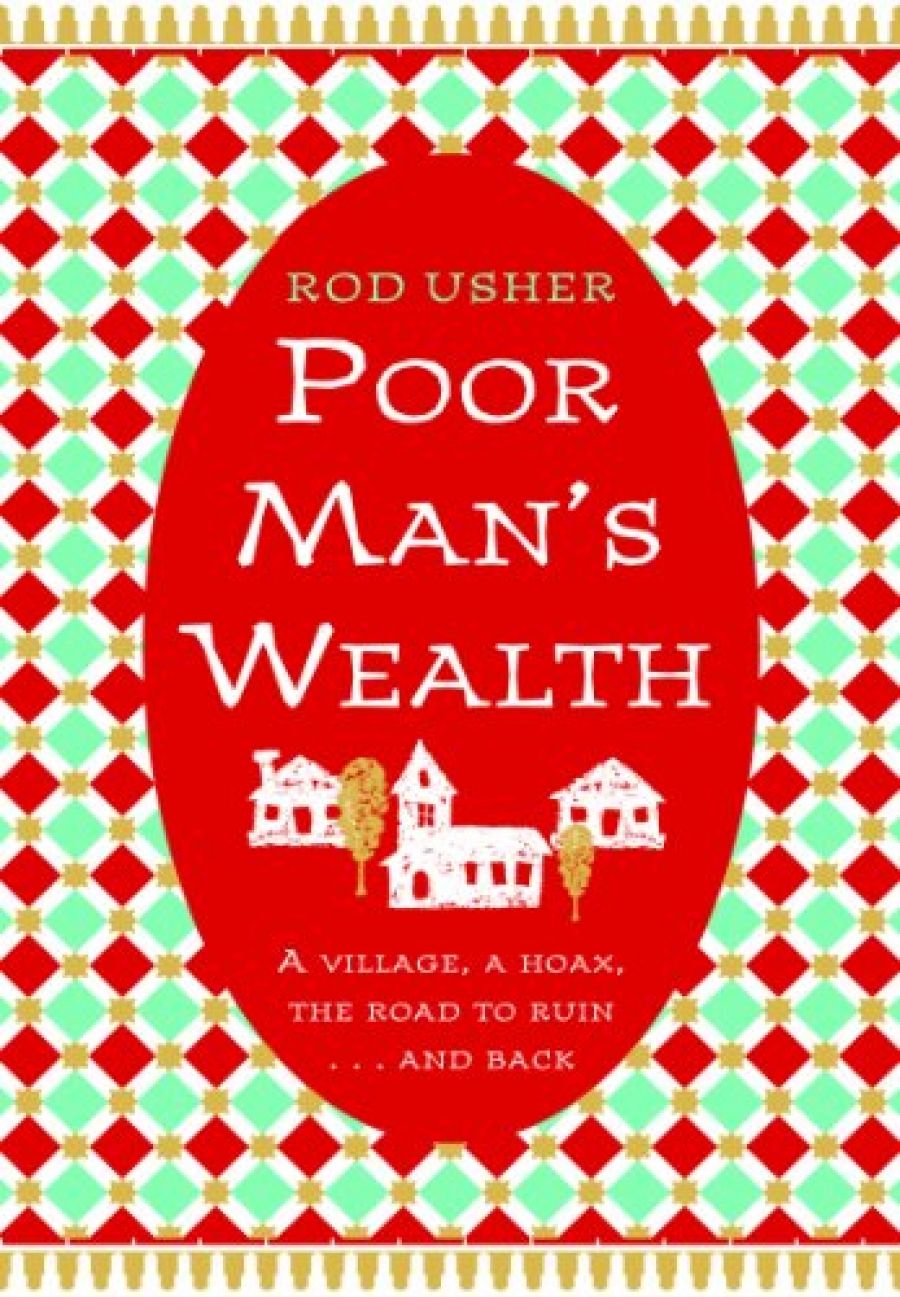
- Free Article: No
- Contents Category: Fiction
- Review Article: Yes
- Online Only: No
- Custom Highlight Text:
Small towns, as anyone who has lived in one can attest, abound in colourful characters. Or is it just that people’s peccadilloes are magnified without the distractions of the madding crowd? Rod Usher knows a thing or two about small towns; he happens to live in one: the village of Barcarrota in Extremadura, Spain. After a long career in journalism – including stints as literary editor of The Age, chief subeditor of The Sunday Times in London, and as a senior writer for TIME magazine in Europe – he opted for the quiet life to concentrate on his literary career. He has published two books of poetry, Above Water (1985) and Smiling Treason (1992), two previous novels, A Man of Marbles (1989) and Florid States (1990), and some non-fiction. Echoes of that work resound in the new book … but more of that later.
- Book 1 Title: Poor Man’s Wealth
- Book 1 Biblio: Fourth Estate, $27.99 pb, 323 pp, 9780732294519
It is a while since Usher left TIME. In a 2001 piece in that magazine, Usher was lauded as someone who ‘demonstrated a rare facility for both the mundane and the profound’ – a telling description. Fast forward a decade and Poor Man’s Wealth, his new novel, exemplifies those qualities and proves that in one can be found the seeds of the other. Prosaic lives in a rural backwater in an unnamed Spanish-speaking country take on much more than prosaic dimensions in this fable. It is also a satire on the foibles of the human heart and has elements of the picaresque, which seems only fitting since the picaresque novel was invented by the Spanish in the sixteenth century. In a picaresque novel you need a colourful hero who lives by his wits in a corrupt society. That, at least partly, describes the chunky protagonist of Usher’s novel, one El Gordo (the fat one), mayor of Higot, a dusty pueblo (village) that is down on its luck.
The country (a Bizarro World version of Spain, perhaps?) that serves as the setting is ruled over by a dictator, Generalissimo Mordaz. One imagines that as well as the numerous dictators who have ruled over the Spanish-speaking countries of South America, there must be echoes of the reviled Spanish dictator General Franco in this character. Extremadura played an infamous role in Franco’s career. The Battle of Badajoz in Extremadura in 1936 was one of the first major victories for Franco’s Nationalists. The local people paid, in blood, for opposing him in the Spanish Civil War.
One imagines that in the village where Usher lives with his Spanish wife the memory of Franco’s régime (he ruled Spain from 1936 to 1975) would still loom large in the living memory of locals. They say for evil men to prosper good men must do nothing; perhaps this story proves otherwise. El Gordo and the citizens of Higot don’t rock the boat politically, but they do buck the system in a sense, by living decent, honest lives.
El Gordo is a frustrated writer who is penning this story in awkward English to escape the scrutiny of the ruling junta. Inspired by the visit of an inspirational Englishman, Mister Giles, and his manservant, Todforth, El Gordo gorges himself on English literature. He writes at night and tells anyone who asks that he plans to be ‘a novel writer in English. Only confirming what a harmless fool he is.’ But he also happens to be mayor, a man with responsibilities. The fact is that his town is dying. It has always relied on the tobacco trade, and that is not what it used to be.
El Gordo and a cabal of citizens form the Marisol Committee, a group of local councillors who plan to save their town by turning it into a tourist attraction. This is where Usher’s novel comes slightly unstuck. Their scheme – a hoax involving a form of mass narcolepsy – is too far-fetched even for a writer who excels at whimsy. Of course, this is a novel, a fantasy with ulterior motives, and the author needed a foil for his narrative, but the central premise and the whole sleep-related theme are clunky. The book could have done without it and relied on the good-humoured narration, the charming, idiosyncratic characters, and the developing love story between El Gordo and local lady Corrion. Their relationship proves that the heart is, as Woody Allen once said, ‘a very resilient little muscle’. Make that a big muscle in the case of El Gordo. Despite my misgivings about the hoax that the Marisol Committee comes up with to attract tourists (it works, for a while), the book is a delightful and imaginative one. Usher creates a world in which ordinary people are not ground down or destroyed by repression. They find a way to live and be kind to each other, despite totalitarian rule. At one stage El Gordo forsakes Higot for a trip to England to rekindle his love of all things English, but returns to ‘that forgotten pueblo without a bus service’ to follow his heart.
In Under Milk Wood, Dylan Thomas created the small Welsh village of Llareggub to explore universal themes in a microcosm. Rod Usher gives us Higot. It is, to borrow from Thomas, an ‘ugly, lovely town’ and an amusing place to tarry in the pages of this engaging entertainment.


Comments powered by CComment